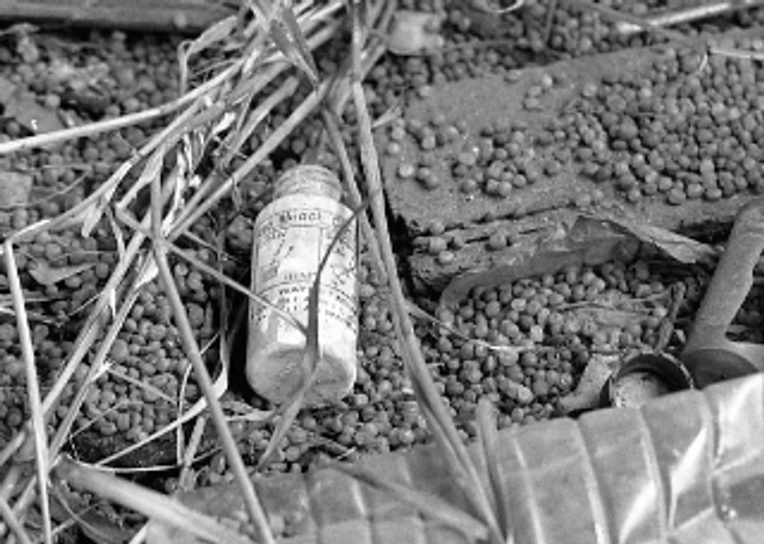This post builds on the research article “Incitements to Discourse: Illicit Drugs, Harm Reduction, and the Production of Ethnographic Subjects,” which was published in the November 2008 issue of the Society’s peer-reviewed journal, Cultural Anthropology.

Editorial Footnotes
Cultural Anthropology has published many essays that critically engage Foucault’s conception of governmentality. See, for example, Paul Hanson’s “Governmentality, Language Ideology, and the Production of Needs in Malagasy Conservation and Development” (2007); Kaushik Ghosh’s “Between Global Flows and Local Dams: Indigenousness, Locality, and the Transnational Sphere in Jharkhand, India” (2006); Olga Demetriou’s “Streets Not Named: Discursive Dead Ends and the Politics of Orientation in Intercommunal Spatial Relations in Northern Greece” (2006); and Aradhana Sharma’s “Crossbreeding Institutions, Breeding Struggle: Women’s Empowerment, Neoliberal Governmentality, and State (Re)Formation in India” (2006).
Cultural Anthropology has also published other essays that analyze the practices and politics of ethnography. See, for example, Charles R. Hale’s “Activist Research v. Cultural Critique: Indigenous Land Rights and the Contradictions of Politically Engaged Anthropology” (2006); Quetzil E. Castañeda’s “Ethnography in the Forest: An Analysis of Ethics in the Morals of Anthropology” (2006); and Alexandra Bakalaki’s “Students, Natives, Colleagues: Encounters in Academia and in the Field” (1997).



Related Reading
Bluthenthal, Ricky N., Rachel Anderson, Neil M. Flynn, and Alex H. Kral. 2007 "Higher Syringe Coverage Is Associated with Lower Odds of HIV Risk and Does Not Increase Unsafe Syringe Disposal among Syringe Exchange Program Clients." Drug and Alcohol Dependence 89(2-3):214-222.
Bourgois, Philippe and Jeff Schonberg. 2009 Righteous Dopefiend. Berkeley: University of California Press. The University of California Press link includes free access to "Intimate Apartheid," the first chapter of Righteous Dopefiend.
Burchell, Graham, Colin Gordon, and Peter Miller, eds. 1991 The Foucault Effect: Studies in Governmentality. Chicago: University of Chicago Press.
Duff, Cameron. 2004 "Drug Use as a 'Practice of the Self': Is There Any Place for an "Ethics of Moderation" in Contemporary Drug Policy?" International Journal of Drug Policy 15:385-393.
Ettore, Elizabeth. 2004 "Revisioning Women and Drug Use: Gender Sensitivity, Embodiment and Reducing Harm." International Journal of Drug Policy 15:327-335.
Ferrell, Jeff, and Mark Hamm. 1998 Ethnography at the Edge: Crime, Deviants and Field Research. Boston: Northeastern University Press.
Foucault, Michel. 1980 Power/Knowledge: Selected Interviews and Other Writings, 1972-1977. Colin Gordon, ed. New York: Pantheon.
1984 The Foucault Reader. Paul Rabinow, ed. New York: Pantheon.
1991 Governmentality. In The Foucault Effect: Studies in Governmentality. Graham Burchell, Colin Gordon, and Peter Miller, eds. Chicago: University of Chicago Press.
1997 Ethics: Subjectivity and Truth. Paul Rabinow, ed. New York: New Press.
Gusfield, Joseph. 1963 Symbolic Crusade: Status Politics and the American Temperance Movement. Bloomington: University of Indiana Press.
Herdt, Gil, and Shirley Lindenbaum, eds. 1992 The Time of AIDS: Social Analysis, Theory, and Method. Newbury Park, CA: Sage.
Hughes, Patrick H. 1977 Behind the Wall of Respect: Community Experiments in Heroin Addiction Control. Chicago: University of Chicago Press.
Hughes, Patrick H., and Jerome H. Jaffe 1971 "The Heroin Copping Area: A Location for Epidemiological Study and Intervention." Archives of General Psychiatry 24:394-400.
Lindenbaum, Shirley. 1992 Knowledge and Action in the Shadow of AIDS. In The Time of AIDS: Social Analysis, Theory, and Method. Gil Herdt and Shirley Lindenbaum, eds. Pp. 319-334. Newbury Park, CA: Sage.
Mugford, Stephen. 1993 "Message in a Toilet." International Journal of Drug Policy 4(3). Available on-line at http://www.drugtext.org/library/articles/93435.htm
Ning, Ana M. 2005 "Games of Truth: Rethinking Conformity and Resistance in Narratives of Heroin Recovery." Medical Anthropology 24:349-382.
Page, J. Bryan, Dale D. Chitwood, Prince C. Smith, Normie Kane, and Duane C. McBride. 1990 "Intravenous Drug Use in Miami." Medical Anthropology Quarterly 4(1):56-71.
Rose, Nikolas. 1996 "The Death of the Social? Re-Figuring the Territory of Government." Economy and Society 25(3):327-356.
Schoepf, Brooke G. 2001 "International AIDS Research in Anthropology: Taking a Critical Perspective on the AIDS Crisis." Annual Review of Anthropology 30:335-361.
Singer, Merrill. 2004 Why Is It Easier to Get Drugs Than Drug Treatment in the United States? In Unhealthy Health Policy: A Critical Anthropological Examination. Arachu Castro and Merrill Singer, eds. Pp. 287-301. Walnut Creek, CA: AltaMira Press.
Editorial Overview
In the November 2008 issue of Cultural Anthropology, Nancy Campbell and Susan Shaw analyze the subtle interplay of harm reduction discourse and the strategies of illicit drug users, and illustrate how critical discourse and ethnographic practices can be adopted by the state and molded into regulatory surveillance. In “Incitements to Discourse: Illicit Drugs, Harm Reduction, and the Production of Ethnographic Subjects” Campbell and Shaw analyze how recent developments in the illicit drug and public health arenas have intensified the contradictions that both drug users and social science researchers inhabit. Substance abuse is a key site where governmentality “hits the ground,” and Campbell and Shaw situate drug users and drug ethnographers alike in the historical unfoldings of the forces of neoliberalism, the War on Drugs, and the HIV epidemic.
Campbell and Shaw show “how ethnographers were assimilated to the purposes of surveillance for the sake of governance while at the same time diffusing harm reduction norms and practices,” acting as instruments of governance even while criticizing these discourses and organizational forces. Noting such frequent assertions among drug users as “We always use bleach” and “We never share needles,” Campbell and Shaw understand these statements as strategic articulations of ethical personhood, but also as markers of how “the incitement to discourse intrinsic to contemporary drug ethnography dictates that all research participants voice their commitment to harm reduction…The structural dualities imposed upon ethnographic practice present ethical dilemmas that must be navigated in order for ethnographic observations to take place at all—for ethnographers, too, are ethical subjects subject to the enabling constraints of the discourse that speaks through them.”
By interrogating the norms created by the discourse between drug researchers and injections drug users, Nancy Campbell and Susan Shaw draw attention to the unintentional role of drug researchers in creating ethical subjects.
There are no easy answers to the complex role of drug researchers who work with federal agencies. This supplemental page uses Incitements as a central node for pulling together work on injection drug use (IDU) and drug research that might not otherwise be in conversation. To this end, this page includes resources for harm reduction and medical treatment, scholarly articles, and media representations of risk and addiction.
Two sections -- For Classroom Discussion and Homework Assignments -- are designed encourage students' critical thinking about the creation of ethical subjects, harm reduction, and ethnographic drug research.